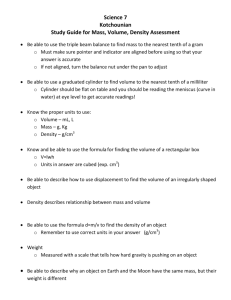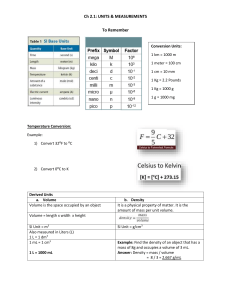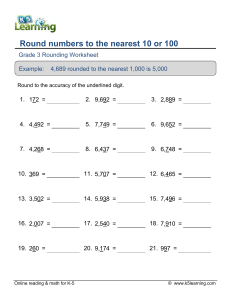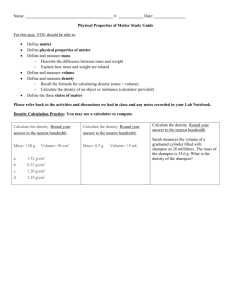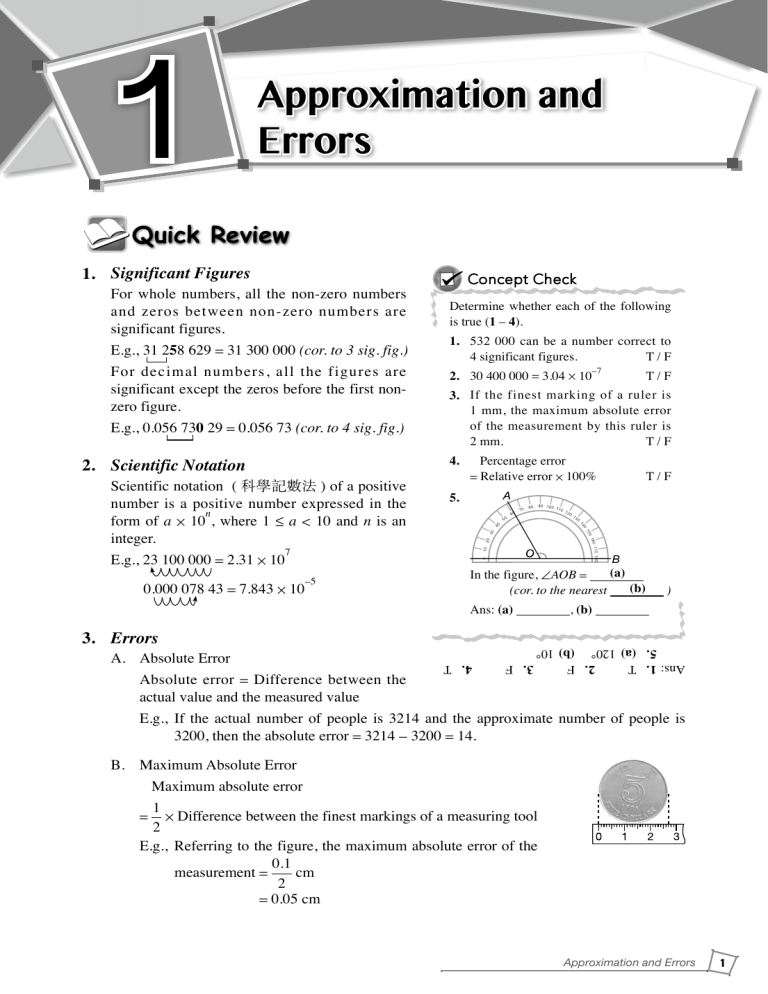
1 Approximation and Errors Quick Review 1. Significant Figures For whole numbers, all the non-zero numbers and zeros between non-zero numbers are significant figures. E.g., 31 258 629 = 31 300 000 (cor. to 3 sig. fig.) For decimal numbers, all the figures are significant except the zeros before the first nonzero figure. E.g., 0.056 730 29 = 0.056 73 (cor. to 4 sig. fig.) 2. Scientific Notation Scientific notation ( 科學記數法 ) of a positive number is a positive number expressed in the n form of a × 10 , where 1 ≤ a < 10 and n is an integer. Determine whether each of the following is true (1 – 4). 1. 532 000 can be a number correct to 4 significant figures. T/F 2. 30 400 000 = 3.04 × 10-7 T/F 4.Percentage error = Relative error × 100% T/F 3. If the finest marking of a ruler is 1 mm, the maximum absolute error of the measurement by this ruler is 2 mm. T / F 5. 7 -5 0.000 078 43 = 7.843 × 10 3. Errors A. Absolute Error Absolute error = Difference between the actual value and the measured value (a) In the figure, ∠AOB = (b) (cor. to the nearest Ans: (a) , (b) ) Ans: 1. T 2. F 3. F 4. T 5. (a) 120° (b) 10° E.g., 23 100 000 = 2.31 × 10 Concept Check E.g., If the actual number of people is 3214 and the approximate number of people is 3200, then the absolute error = 3214 - 3200 = 14. B. Maximum Absolute Error Maximum absolute error 1 × Difference between the finest markings of a measuring tool 2 E.g., Referring to the figure, the maximum absolute error of the 0.1 cm measurement = 2 = 0.05 cm = Approximation and Errors 1 C. Relative Error Relative error = Maximum absolute error Absolute error or Measured value Exact value D. Percentage Error Percentage error = Relative error × 100% E. Limits of an Measurement Upper limit = Measured value + Maximum absolute error Lower limit = Measured value - Maximum absolute error Mistake Hunt 1. !! If the length of a pencil is 20 cm ± 1 cm, find the percentage error. Solution: 1 cm 2 0.5 cm = ±1 cm means that the maximum absolute error is 1 cm. Hence the correct solution is as follows: Maximum absolute eror = Maximum absolute error = 1 cm 1 cm × 100% 20 cm = 5% 0.5 cm × 100% 20 cm = 2.5% Percentage error = Percentage error = ➥ ➥ 2. Level-up Practice Q. 5 The length and width of a rectangle are 6 cm and 4 cm respectively, correct to the nearest 0.5 cm. Find the largest possible area of the rectangle. !! Solution: Area of the rectangle = 6 × 4 cm2 = 24 cm 2 0.5 2 Largest possible area = 24 + cm 2 = 24.25 cm ➥ ➥ 2 Level-up Practice Q. 17 The maximum absolute error 0.5 cm is for the length and width, not for the area. Hence the correct solution is as follows: Maximum length = (6 + 0.25) cm = 6.25 cm Maximum width = (4 + 0.25) cm = 4.25 cm Largest possible area = 6.25 × 4.25 cm2 2 = 26.5625 cm What's Wrong? Study each of the following and determine whether the solution of each question is correct. If it is not, correct the solution. 1. If the temperature of a room is 25°C ± 0.5°C, find the percentage error. Solution: 0.5°C × 100% 25°C = 2% Percentage error = 2 Train Up Mathematics 2 (S2 to S3) 2. The base and height of a triangle are 10 cm and 6 cm respectively, correct to the nearest cm. Find the largest possible area of the triangle. Solution: Largest possible area = 1 × (10 + 1) × (6 + 1) cm 2 2 = 38.5 cm 2 Level-up Practice Multiple-choice Questions 1. Round off 0.035 49 to 3 significant figures. 2. The diameter of the Moon is about 3 500 000 m. Use scientific notation to represent this diameter. A. 0.03B. 0.04C. 0.0354 D. 0.0355 5 5 A. 3.5 × 10 mB. 35 × 10 m 6 6 C. 3.5 × 10 mD. 35 × 10 m 3. The weight of a bag of vegetables is 550 g (correct to the nearest 10 g). Which of the following can be its actual weight? A. 555 g 4. C. 544 g D. 500 g What is the maximum absolute error of a measurement of 120 cm which is correct to the nearest 10 cm? A. 2.5 cm 5. B. 554.3 g B. 5 cm C. 10 cm D. 20 cm The length of a roll of aluminium foil is 200 m, correct to 2 significant figures. What is the percentage error? A. 2.5%B. 5%C. 10%D. 50% Basic Questions 6. How many significant figures are there in the following numbers? (a) 20 413 (d) 0.020 10 7. (b) 0.2104 (e) 20.010 (c) 21 400 Round off 24.310 472 to the following numbers of significant figures. (a) 2 8. (b) 5 (c) 6 State the number of significant figures in 21 000 if it is corrected to the nearest (a) integer; (b) ten; (c) thousand. Using a calculator, evaluate the following expressions and write the answers in scientific notation correct to 3 significant figures (9 – 10). 9. 678 × 12 345 + 3.5 × 10710. (2.532 × 108 - 7.7734 × 106) ÷ (3.345 × 10-3) Approximation and Errors 3 11. Without using a calculator, evaluate 3.1 × 1011 + 2.55 × 1010 - 365 × 108. 12. Complete the following table. Measured value (a) 10 kg (correct to the nearest kg) (b) 4.0 min (correct to the nearest 0.1 min) (c) 12.5 cm (correct to the nearest 0.5 cm) Maximum Relative error absolute error Percentage error 13. A value is measured as 43.2, correct to the nearest 0.1. What are the upper and lower limits of this measurement? 14. The weight of a boy is shown on the right. (a) Write down the measured weight of the boy. (b) What is the maximum absolute error of this measurement? (c) What is the relative error of this measurement? Enhanced Questions 15. The weight of a pack of rice is 5 kg, correct to the nearest 0.1 kg. Find (a) the upper limit of its actual weight; (b) the lower limit of its actual weight; and (c) the relative error and percentage error of its measured weight. 4 Train Up Mathematics 2 (S2 to S3) 16. (a) If the length of a piece of string is measured as 3 cm correct to the nearest cm, find the least possible length of the string. (b) The length of a piece of string is measured as 1.5 m correct to the nearest 0.1 m. (i) Is it possible that the actual length of this string exceeds 156 cm? Explain your answer. (ii) Is it possible to cut this string into 52 pieces of shorter strings, with each length measured as 3 cm correct to the nearest cm? Explain your answer. 17. A boy uses a ruler with finest markings 0.1 cm to measure the length and width of his mathematics textbook. He finds that the length and width are 18.8 cm and 26.1 cm respectively. (a) (i) Upper limit of the length = cm (ii) Lower limit of the length = cm (iii) Upper limit of the width = cm (iv) Lower limit of the width = cm (b) (i) What is the measured area of the textbook? (ii) Can the actual area of the textbook be 492 cm2? Explain your answer. Self-assessment 1. Round off 3 485 008.384 to 3 significant figures and write the answer in scientific notation. 2. In the figure, find the percentage error of the measurement, correct the answer to 3 significant figures. Approximation and Errors 5 3. The lower limit and the upper limit of the height of a boy are 170.5 cm and 171.5 cm respectively. Find the relative error of the measurement. Knowledge Extension Corner Errors can be accumulated in calculation process. Consider a rectangular metal block whose dimensions are measured as 15 cm × 20 cm × 8 cm, correct to the nearest cm. 1 cm = 0.5 cm 2 Measured volume = 15 × 20 × 8 cm3 = 2400 cm3 Maximum absolute error of length = Largest possible volume = (15 + 0.5)(20 + 0.5)(8 + 0.5) cm3 = 2700.875 cm3 Least possible volume = (15 - 0.5)(20 - 0.5)(8 - 0.5) cm3 = 2120.625 cm3 Largest possible volume - Measured volume = (2700.875 - 2400) cm3 = 300.875 cm3 Measured volume – Least possible volume = (2400 – 2120.625) cm3 = 279.375 cm3 \ \ 300.875 cm3 > 279.375 cm3 The accumulated error of volume is 300.875 cm3. Work it out 1. The radius of a circle is measured as 10 cm, correct to the nearest cm. Find the accumulated error of the area of the circle. Give the answer in terms of p. 2. The dimensions of a rectangular carton are measured as 50 cm × 40 cm × 30 cm, correct to the nearest cm. Find the accumulated error of the capacity of the carton. Internet Adventure Difficulties in Approximation During the ‘July 1 Protest’ in each year, different parties may give different approximation of the number of protesters. In fact, difficulties may arise when doing approximation in real-life situation. Let’s see the following website for more details. http://hkupop.hku.hk/english/columns/columns23.html 6 Train Up Mathematics 2 (S2 to S3)
